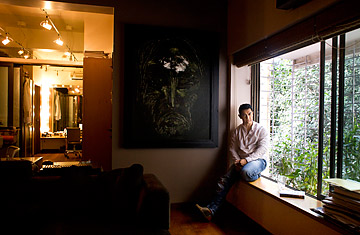
Portrait of Aamir Khan at his residence in Pali Hills, Mumbai, June 8, 2012
(3 of 4)
The format borrows from U.S. confessional shows, leading inevitably to comparisons to Oprah. But the similarity is superficial, at best. Unlike Oprah Winfrey, the queen of American chat, Khan doesn't give his audience a break with digressions into health advice, cooking tips or celebrity interviews. The world of Satyamev Jayate is too full of serious troubles to allow for the respite of a low-fat cookie recipe. For the most part, too, Khan is careful to avoid easy scapegoating. When a woman shows pictures of her husband who, she alleges, bit off portions of her face because she "failed" to give him a son, the man's own face is pixelated out to hide his identity. Khan says this is not merely a precaution against legal action. "I'm not interested in individual villains," he says. "This is not a movie, so I don't need to show that so-and-so is a monster who gets his just desserts in the end. I'm interested in the larger issue: What is it about our society that makes a man think that a son is more important than a daughter?"
Collective responsibility is Khan's mantra. At some point in most episodes, the star looks straight at the camera, squares his jaws and delivers some variation of the theme that all Indians are at least culpable for the inequities in their society. He fixes me with that same look — stern but sincere — from his perch on the faded green armchair and launches into a soliloquy about responsibility: "The solution has to start with me, with every individual. After all, if these terrible things are happening in my society, then I have a share of the blame, because I've done nothing to stop them. A solution can only begin to appear once I accept it's partly my fault, and then you accept that it's partly your fault, and a third person [does that], and a fourth person." I come to understand why his critics say Khan's prescriptions are no more substantive than a fatherly lecture on morals.
While Satyamev Jayate is Khan's first foray into television, he dips into the Bollywood bag of tricks to keep his audience's attention. Each episode comes with large dollops of melodrama, the host employing the purple prose favored by Indian scriptwriters. Speaking of a whistle-blower allegedly murdered for exposing corruption in government road-building contracts, he intones in Hindi: "The torch of truth that he lit should never be allowed to wane in our hearts." When guests recount their personal tragedy, Khan's expressive face registers shock, horror and pain; he chokes up, and the camera repeatedly catches him wiping away tears. Every episode ends with a rousing call to action, usually in the form of song. "He has to use the language of Bollywood," says Anurag Kashyap, one of the hottest young directors in Hindi cinema. "If it were cut-and-dried, it would not be effective." Khan says his responses on the show are genuine, that he is not acting. But he admits to manipulating the emotions of his audience. "I'm not a journalist, I'm a storyteller," he says. "I can make you angry, sad, happy ... That's my skill set."
The episode on domestic violence, for instance, features an all-male audience kept in the dark about the show's subject. Khan announces that they will discuss "the security of women in our society," and makes a maudlin appeal to the men as "protectors and defenders" of women. Khan then asks, "Where are women most unsafe?" It's a cue to a field report from a Mumbai hospital, where a doctor says six out of 10 women brought in for care are victims of violence at home. Now Khan unleashes a shocking statistic: 50% of Indian women have at some point been victims of domestic violence. The audience is on the ropes. "Here I had them preening as protectors of women," Khan tells me, his eyes lighting up as he recollects the men's reactions of shock and embarrassment. "Now they're suddenly confronted with the realization that, statistically, there's a chance that many of them sitting there have [been violent to women]. There's no getting away from it."
Leading from the Front
Khan's first ambitions in activism were humble: years ago, he toyed with the idea of making some public-service documentaries on road safety and etiquette. He dropped the idea as unworkable (a pity, most Indians would agree) but felt "like there was something I had to offer, somewhere down the line." That instinct is the product of nurture as much as nature. Khan's father Tahir Hussain, a moderately successful producer in the 1970s and '80s, made movies with social messages, including the 1982 Dulha Bikta Hai (Bridegrooms for Sale), an indictment of the ancient dowry system in which the parents seeking a husband for their daughter must offer inducements in cash, jewelry and other valuables. (Three decades on, the practice is still prevalent in India and is covered in an episode of Khan's show.)
